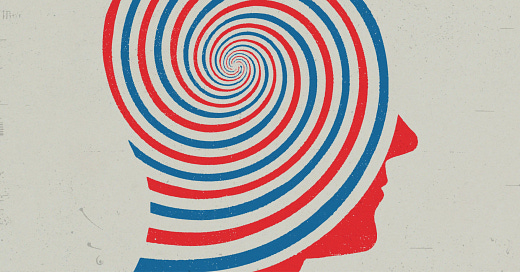My new piece in TIME is a profile of the Niskanen Center, a D.C. think tank that’s found surprising success with new policy ideas that don’t fit neatly into the traditional left-right policy paradigm.
Samuel Hammond sits at a cluttered desk in his Washington office, holding up the pamphlet that changed the world. “It’s a giant space fetus,” the think-tank staffer says with a grin. “You’re never going to get that from a liberal child-welfare organization.”
The pamphlet, titled “The Conservative Case for a Child Allowance,” does indeed show a big pink fetus, silhouetted against a globe and held by a pair of hands. Released in early 2021, the paper features an epigraph from the Book of Psalms: “Children are a gift from the Lord.” In it, Hammond and his co-author argue that giving cash to parents would strengthen families, bolster the institution of marriage, and reduce abortions, while at the same time boosting the economy and lessening dependence on the state. As the title suggests, it’s a right-wing argument for a proposal more often associated with the bleeding-heart left.
The article is, in part, an interrogation of the role of ideas in modern American policymaking, at a time when many view D.C. as impossibly gridlocked and out of touch. In fact, I argue, Niskanen may be better positioned than its more established counterparts to forge a way forward in the post-Trump era:
The Trump years were not exactly a golden age of policy intellectualism. D.C. careened from crisis to crisis; Congress struggled to keep the lights on. But Trump’s rise was also a wake-up call to the political world. He channeled a widespread sense of frustration with failing institutions and the status quo—a fed-upness that policymakers had preferred to ignore or downplay. And he trampled party dogmas, disdaining former GOP commitments such as free trade, deficit reduction, foreign alliances, and entitlement reform. As the dust settles from his presidency, it’s become clear that the ideological reordering Trump set in motion is permanent and ongoing—and that neither major party has successfully articulated a vision for America’s future that’s persuasive to a broad swath of the electorate.
Read the article here.
On another note, last week I attended Bernie Sanders’s book-tour kickoff at a huge concert venue in D.C. Sanders gained a massive youth following with his 2016 and 2020 presidential campaigns. But these days, I found, he’s struggling to convince them that change is possible in dark times:
Bernie Sanders is here to answer a question nobody in this room was asking: Is it okay to be angry about capitalism?
It’s late on a weeknight at The Anthem, a 3,000-seat concert hall on the trendy, upscale D.C. waterfront that recently hosted Bush and the Disco Biscuits. The bar is open, but the venue’s floor is full of orderly rows of chairs, the air is uncharacteristically free of pot smoke, and the merch tables feature no T-shirts or posters, only stacks of the 81-year-old left-wing senator’s latest book, It’s OK to Be Angry About Capitalism. Still, to the overwhelmingly young crowd that has paid $55 to $95 per ticket, they might as well be seeing a rock star—the Mick Jagger of Medicare-for-All.
Read the article here.



